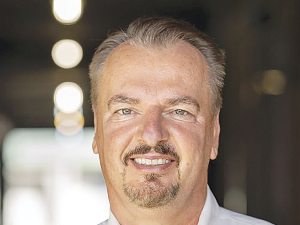The politics of climate change
OPINION: The Financial Times, a major international newspaper, featured New Zealand on its front page at the beginning of June. It wasn't for the right reasons.
 Frank Mitloehner says the GWP (100) measure has major limitations when livestock numbers are constant and/or falling and methane is being reduced.
Frank Mitloehner says the GWP (100) measure has major limitations when livestock numbers are constant and/or falling and methane is being reduced.
Recognition is urgently needed on a new measure for short and long-lived greenhouse gases and their impact on global warming.
That was the strong message given to attendees at the recent Red Meat Sector Conference by Dr Frank Mitloehner of the University of California Davis - a world expert on livestock emissions research.
He explained how the measure of GWP (100) - the matrix used to calculate the impact of different gas emissions on warming for the past 30 years - is "problematic" when methane levels are falling.
"It has real strong limitations when livestock numbers are constant and/or falling and methane is being reduced."
Mitloehner told attendees that methane is a potent greenhouse gas (GHG), with its global warming potential (GWP) 28 stronger than that of carbon.
"Methane is a fast and furious gas, meaning it is 28 times more powerful than carbon, but it also disappears quickly."
He explained how emissions produced from fossil fuels are vastly different to those produced by livestock because the half-life of methane is around 12 years, compared to the half-life of carbon, which is more like 1,000 years.
"There is a molecule in the atmosphere called hydraulic radical that destroys methane, which generally takes about a decade. However, the same does happen with CO2 (carbon) or nitrous oxide."
Mitloehner says this means when you drive a car, the emissions it puts into the atmosphere keeps a warming effect for 1,000 years. However, he explained that with a constant source of methane (same number of livestock) then there is no additional warming.
“So, if you reduce methane emission then you reduce warming.”
He said this is what the Paris Accord called for – a reduction in global warming.
“Warming is what it is all about and that is why we care about greenhouse gas emissions.”
Mitloehner said if livestock numbers stay constant then they do not add to warming, but if these numbers fall that actually reduces warming. He gave as an example the drop in the US dairy herd from a peak herd of 25 million 50 years ago to around 9 million today.
“However, with these 9 million dairy cows we are now producing 16% more milk than we use to with 25 million. That means the carbon footprint of a gallon of milk today is two-thirds of what it was in 1950.”
Mitloehner says research at Oxford University found that GWP (100) overestimates the impact of constant sources of methane on warming by a factor of 4.
“GWP (100) is used all over the world to estimate methane sources on warming, but it doesn’t do a proper job for constant sources of methane or reducing trajectories either.”
He says the development of Oxford’s new matrix GWP* properly calculates the impact of methane on climate over time.
“Methane is not a stop gas, it is a flow gas. It is not just produced but it is also atmospherically removed,” Mitloehner explained.
“If you keep a herd size constant, you don’t add additional carbon to the atmosphere and no additional warming to our planet.”
He added, if livestock numbers drop, then you are reducing methane and having the same impact as planting forests in removing carbon from the atmosphere and leading to negative warming.
“Methane is not just C02 on steroids and is not a super pollutant,” Mitloehner concluded. “Methane is a super opportunity for the agricultural sector. If we can manage methane, agriculture can be part of the solution to reduce global warming.”
Mitloehner says methane reductions should be encouraged so farmers can be part of the climate solution. However, he believes policies to encourage reductions should take a carrot and not a stick approach.
The World Wide Sires National All Day Breeds Best Youth Camp Best All Rounder plaudit has become family affair, with 2026 Paramount Cup winner Holly Williams following in her sister Zara's footsteps.
DairyNZ is giving New Zealand farmers a unique opportunity to gain hands-on governance and leadership experience within the dairy sector.
Herd improvement company LIC has posted a 5.2% lift in half-year revenue, thanks to increasing demand for genetics.
According to the latest Fresh Produce Trend Report from United Fresh, 2026 will be a year where fruit and vegetables are shaped by cost pressures, rapid digital adoption, and a renewed focus on wellbeing at home.
The Roar is a highlight of the game hunting calendar in New Zealand, with thousands of hunters set to head for the hills to hunt male stags during March and April.
OPINION: The past few weeks have been tough on farms across the North Island: floods and storms have caused damage and disruption to families and businesses.

OPINION: Meanwhile, red blooded Northland politician Matua Shane Jones has provided one of the most telling quotes of the year…
OPINION: This old mutt has been around for a few years now and it seems these ‘once in 100-year’ weather…